Euphorbia cumulicola
Phytologia 67: 45. 1989.
Herbs, usually annual, rarely perennial, with taproot. Stems prostrate, 10–20 cm, glabrous. Leaves opposite; stipules distinct, linear-subulate, usually divided into 3–7 linear segments, 0.5–1 mm, glabrous; petiole 0.5–1 mm, glabrous; blade narrowly elliptic to lanceolate, 4–8 × 1–2 mm uniform in size, base asymmetric, obtuse to rounded, margins entire, apex obtuse to acute, surfaces green to reddish flushed, glabrous; only midvein conspicuous. Cyathia solitary at distal nodes; peduncle 1 mm. Involucre campanulate, 0.9–1.1 × 1–1.3 mm, glabrous; glands 4, green to red, slightly stipitate, subcircular, 0.1 × 0.1 mm; appendages white or pink, fringing edge of gland, short-flabellate, often rudimentary, 0.1–0.2 × 0.1 mm, distal margin crenate or entire. Staminate flowers 5–8. Pistillate flowers: ovary glabrous; styles 0.2–0.3 mm, 2-fid at apex to nearly 1/2 length. Capsules ovoid or subglobose, 1.8–2 × 2–2.3 mm, glabrous; columella 1.2–1.5 mm. Seeds white to gray-brown, ovoid, terete to bluntly subangled in cross section, 1–1.3 × 1 mm, smooth or minutely pitted, with smooth brown line from top to bottom on adaxial side.
Phenology: Flowering and fruiting year-round.
Habitat: Sandy oak hammocks, open sandy areas behind mangroves, disturbed sandy sites.
Elevation: 0–10 m.
Discussion
Euphorbia cumulicola could be confused with E. bombensis, both of which are widespread in Florida, but there the latter occurs on beaches close to the ocean, whereas E. cumulicola is not a beach-inhabiting species but occurs in more protected sandy habitats such as hammocks or stabilized dunes behind mangroves. Also, E. bombensis has fleshier leaves and larger seeds, and is more compact in habit than E. cumulicola, which is a more sprawling and densely branched plant with leaves that are usually purplish tinged along the margins.
Selected References
None.
